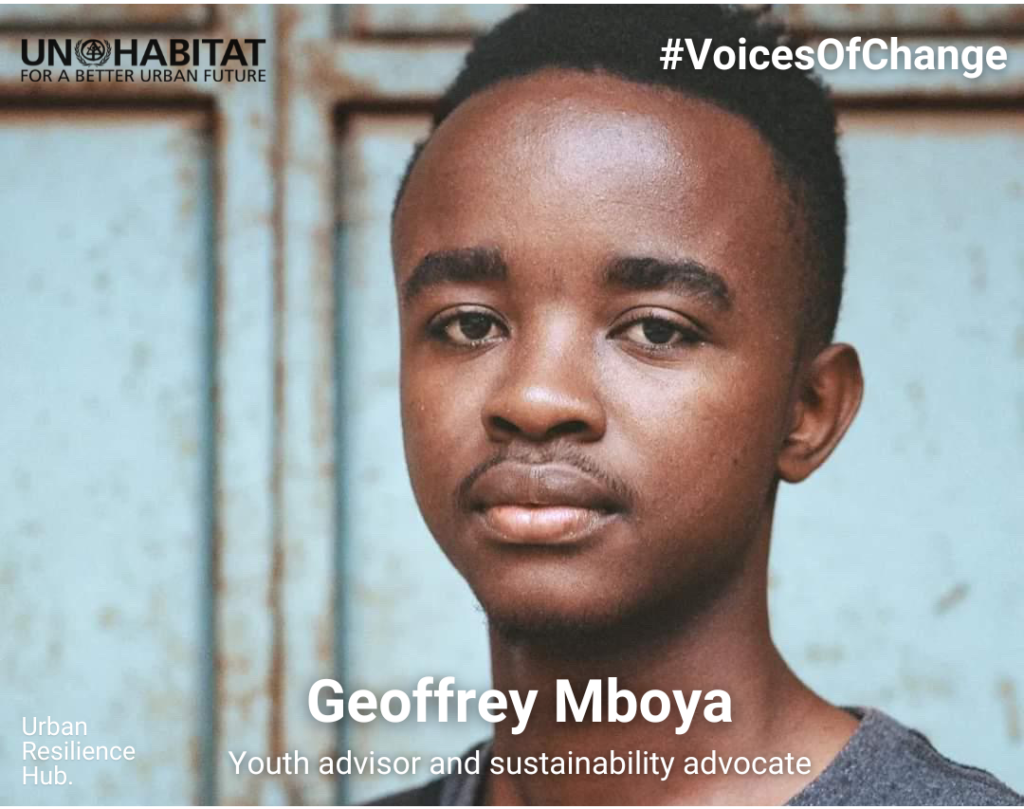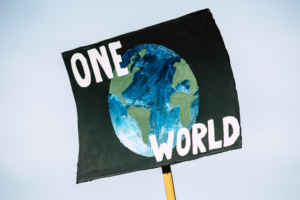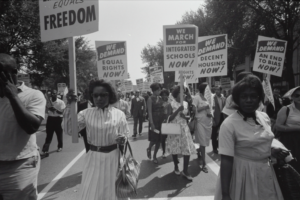We present the second chapter of the series of interviews that make up the Urban Resilience Hub’s communication campaign “Voices of Change”, through which community and urban resilience leaders worldwide explain what their current priorities are and the strategies they follow to address the issues for which they advocate.
In order to implement the City Resilience Global Programme, at the Hub we consider urban resilience to be comprised of four dimensions of resilience: Economic, Environmental, Social and Institutional. We began last month by interviewing Yves Awa Muguma, whose work focuses primarily on the economic resilience dimension, and continue this week with a second community leader whose initiatives focus primarily on the environmental resilience dimension.
On this occasion, we had the opportunity to interview Geoffrey Mboya, a young humanitarian and sustainability advocate born in Mukuru, an informal settlement located in Kenya’s capital, Nairobi, characterized by high levels of poverty, low income and elevated risk of suffering the effects of climate change.
Geoffrey shares with us the origin of this situation, whereby in the capital of the country with the largest economy in East Africa (World Bank) up to more than half of the city’s population lives in slums (UN-Habitat). Among other causes, rapid, poorly planned and uncontrolled urbanization pushes rural residents to live in Nairobi’s more than 40 slums. The dream of moving to the capital is dashed by low wages and rising prices, resulting in the expansion of informal settlements characterized by inexistent infrastructure, difficult access to electricity, poor water services and an ongoing sense of insecurity.
As Geoffrey explains:
“We are witnessing here a very high rate of urbanization, whereby many people are moving to the city with the prospect of finding better jobs and opportunities. However, those families coming from very poor backgrounds end up moving to informal settlements, therefore creating a situation where an increasing number of people are concentrated living with very limited resources.”
Therefore, he appeals to local and governmental institutions to address the need for development of these slums, whose population is already between 500,000 and one million in each of them, as is the case not only in Mukuru, but also in Kibera.
Faced with such an alarming situation, Geoffrey felt from an early age the need to contribute to the improvement of the area where he grew up. “Growing up in a situation of poverty, I became involved from a very young age in community affairs. I remember as a child going with my mother to meet with a group of women who gathered to discuss community issues, environmental programs and initiatives to provide training for people in the community.” Shortly after becoming a finalist in a contest organized by UNICEF Kenya, he realized that the key to being able to thrive lies in having access to education, which enables people to have easier access to job opportunities and development. From then on, “I started volunteering in community initiatives and learning about development issues.” Equipped with that preparation, he subsequently began to play a key role in developing projects and policies as well as using his knowledge to amplify the voices of his community to further promote the reforms needed to improve the situation in Mukuru and many other settlements.
“That’s how I started my journey as a climate and youth advocate and found my place”
Among many other projects, he founded SDGs Mtaani alongside a team of young individuals, a youth-led community action group that aims to highlight the urgency of the effects of poverty on urban slum communities. He also worked as a youth advisor at the We Don’t Have Time non-profit Foundation, participated in COP26 as a climate activist, and is currently focusing his attention on the environmental conservation organization Leaving a Legacy.
Geoffrey targets his endeavors at helping the youth have access to opportunities that people living in disadvantaged conditions often lack. For this reason, he strongly believes that:
“One of the big challenges for urban climate activists is to have the chance to contribute and participate in climate policy decision-making”
Additionally, he identifies underfunding, air pollution and evictions as major challenges currently facing his community, where “more than 40,000 families have already been evicted, a number that is only increasing.” Therefore, when external organizations try to offer their temporary help, “it is key that they listen to the real problems identified by the locals,” because once the real context in which they live is understood, the challenges can be properly addressed.
Geoffrey claims that:
“As a resident and as an advocate of the urban informal settlements, I am calling on our leaders to take into account people’s views. We are not refusing development, we want to be part of that, we want our ideas, our visions, we want our priorities to be taken into account, because they will obviously affect our future.”
He concludes the interview by calling on local governments and national institutions to provide informal settlements with the necessary resources to cope with climatic disruptions, such as the potential negative effects of “El Niño”, as flooding is imminent and drainage infrastructure is inadequate. He emphasizes that the limited government support must be addressed through the introduction of young people into the decision-making process. To this end, he encourages all young individuals who wish to see their community improve, their family prosper and the level of urban resilience facing the impacts of climate change increase, “don’t be afraid to be perfect, find groups of like-minded people who share your passions, start taking action and believe in your progress”.
We feel truly inspired by Geoffrey’s community work and at the Hub we remain grateful to provide a space for voices that tirelessly strive to increase levels of urban resilience locally, nationally and internationally, since amplifying powerful voices is the core goal of our campaign.






